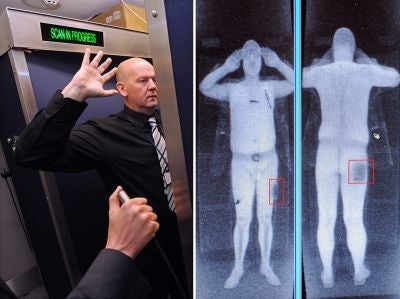US warns of risks of identical airport security measures

Your support helps us to tell the story
From reproductive rights to climate change to Big Tech, The Independent is on the ground when the story is developing. Whether it's investigating the financials of Elon Musk's pro-Trump PAC or producing our latest documentary, 'The A Word', which shines a light on the American women fighting for reproductive rights, we know how important it is to parse out the facts from the messaging.
At such a critical moment in US history, we need reporters on the ground. Your donation allows us to keep sending journalists to speak to both sides of the story.
The Independent is trusted by Americans across the entire political spectrum. And unlike many other quality news outlets, we choose not to lock Americans out of our reporting and analysis with paywalls. We believe quality journalism should be available to everyone, paid for by those who can afford it.
Your support makes all the difference.Airports around the world must adopt different security measures or else it will become easier for terrorists to exploit weaknesses to carry out attacks, US Homeland Security Secretary Janet Napolitano said Friday.
"What we do not want is a cookie cutter approach - where the same measures are in place everywhere - because then terrorists can plan and work around them," she told a news conference in Toledo in central Spain.
Napolitano recommended using a wide range of security measures, including information sharing on suspected terrorists and detection technology like full body scanners, to protect passengers.
"We need all of those layers in sequence to maximize the ability to protect travelers from terrorist acts," she said, adding full body scanners were "a tool" but "there must be a combination of other measures".
"Nations decide for themselves the combination of these measures," she added.
Napolitano is meeting EU officials to try to convince the EU to install body scanners at its main airports for use by US-bound passengers.
The United States has accelerated the installation of the scanners at its airports since the attempted attack on Christmas Day on a jet bound for Detroit from Amsterdam, and Britain and the Netherlands have followed its example.
But other European nations like Germany have been more cautious.
Spain, which holds the rotating presidency of the EU, wants the 27-nation bloc to develop a common policy on the use of the scanners, which can "see" through clothing to reveal concealed liquids, explosives or weapons.
Spanish Interior Minister Alfredo Perez Rubalcaba said Thursday that the European Commission was carrying out the studies into the effectiveness of the devices as well as their possible impacts on health and privacy.
"Once we have these studies on the table we will make a decision," he told journalists following a meeting between Napolitano and EU interior and justice ministers.
The outgoing European Commission dropped plans to introduce the scanners Europe-wide in 2008 after the European Parliament opposed the move, calling for more studies on the possible radiation dangers and privacy issues involved.
Privacy campaigners say the technology violates European law by producing sexually explicit images of the passengers.
They have raised the possibility that images taken by the scanners could be leaked online.
Napolitano will later on Friday meet in Geneva with members of the International Air Transport Association - which represents approximately 230 airlines and more than 90 percent of the world's air traffic - to discuss ways to bolster aviation security.
"The reinforcement of air transport security is an international effort which involves all countries and companies. I am going to Geneva to listen to ideas and the problems she posed," she said.
IATA welcomed the collaborative taken by President Barack Obama's adminstration towards air security.
"This type of approach is really new, it is a historic first," an IATA spokesman said.
csg-ds/cw
Join our commenting forum
Join thought-provoking conversations, follow other Independent readers and see their replies
Comments